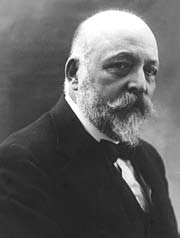Mehmet Emin Yurdakul
Mehmet Emin Yurdakul | |
|---|---|
 | |
| Born | May 13, 1869 Constantinople, Ottoman Empire |
| Died | January 14, 1944 (aged 74) Istanbul, Turkey |
| Nationality | Ottoman, Turkish |
| Occupation | Politician, author |
Mehmet Emin Yurdakul (13 May 1869 – 14 January 1944) was a Turkish nationalist writer, poet and politician. Being an ideologue of Pan-Turkism, his writings and poems had a major impact on defining the term vatan (Fatherland).[1]
Early life and education[]

He was born in Constantinople, Ottoman Empire during the late Tanzimat period on 13 May 1869. His father was Salih Reis, a fisherman, and his mother was Emine Hatun. His received his early education in Istanbul, but didn't formally graduate due to the dire financial situation within the family. He then began a internship in the ottoman administration.[2] He published the book Fazilet ve Asalet in 1891, which caused the prime minister to appoint him to work in his office as the director of documentation.[2]
His early literary work was influenced by the political activist and Islamic ideologist, Jamāl al-Dīn al-Afghānī, who Yurdakul was to get to know in Constantinople in 1892.[3] al-Afghānī died in 1897 and Yurdakul published a compilation of his poetry in the book Türkçe Şiirler, which were accompanied by paintings from Fausto Zonaro.[2]
Political career[]
He joined the Committee of Union and Progress in 1907 which instigated a coup against Sultan Abdul Hamid II in 1908.[2] Following he was employed in the ottoman administration and sent to Trabzon.[2] From 1909 onwards he was appointed Governor of several provinces of the Ottoman Empire.[4] From 1911 onwards, he was involved in the Pan-Turkist associations such as the Association of Turks () and the Turkish Hearths.[5] During World War I, his literary work became popular amongst the adherents of the CUP as his nationalist views did not exclude religion.[3] In 1913 he became a member of the Ottoman Parliament representing Mosul.[4] After the foundation of Turkey in 1923, he was a member of the Grand National Assembly, where he supported the adoption of the Turkish alphabet.[6]
He died on 14 January 1944 and is buried at the Zincirlikuyu Cemetery in Istanbul, Turkey.
Notable works[]

- Fazilet ve Adalet (Virtue and Justice, 1891)
- Türkçe Şiirler (Poems in Turkish, 1898)
- Türk Sazı (Turkish Instrument, 1914)
- Ey Türk Uyan (O Turk Wake Up, 1914)
- Tan Sesleri (Voices of the Dawn, 1915)
- Ordunun Destanı (The Legend of the Army, 1915)
- Dicle Önünde (In Front of Tigris, 1916)
- İsyan ve Dua (The Uprising and the Prayers, 1918)
- Zafer Yolunda (On the Way of Victory, 1918)
- Turan'a Doğru (Towards Turan, 1918)
- Aydın Kızları (Girls of Aydın, 1919)
- Türk'ün Hukuku (The Law of Turk, 1919)
- Dante'ye (To Dante, 1928)
- Kıral Corc'a (To King George, 1928)
- Mustafa Kemal (Mustafa Kemal, 1928)
- Ankara (Ankara, 1939)
References[]
- ^ Landau, Jacob M. (1995). Pan-Turkism: From Irredentism to Cooperation. C.Hurst & Co. ISBN 1-85065-223-6.
- ^ Jump up to: a b c d e Arslanbenzer, Hakan (2016-09-10). "Mehmet Emin Yurdakul: 'My name is Turk'". Daily Sabah. Retrieved 2020-07-28.
- ^ Jump up to: a b Köroğlu, Erol (2007-07-21). Ottoman Propaganda and Turkish Identity: Literature in Turkey During World War I. Bloomsbury Academic. p. 129. ISBN 978-1-84511-490-9.
- ^ Jump up to: a b Dadrian, Vahakn N.; Akçam, Taner (2011-12-01). Judgment At Istanbul: The Armenian Genocide Trials. Berghahn Books. pp. 39–40. ISBN 978-0-85745-286-3.
- ^ Landau, Jacob M. (1981). Pan-Turkism in Turkey: A Study of Irredentism. C. Hurst. pp. 38–40. ISBN 0905838572.
- ^ Bayar, Yesim (2016-10-19). Formation of the Turkish Nation-State, 1920–1938. Springer. p. 57. ISBN 978-1-137-38453-9.
External links[]
- Republic of Turkey Ministry of Culture and Tourism: YURDAKUL, Mehmet Emin
- Biyografi.net - Biography of Mehmet Emin Yurdakul (in Turkish)
- Turkish writers
- Turkish poets
- 1869 births
- 1944 deaths
- Pan-Turkists
- Members of the Grand National Assembly of Turkey
- Liberal Republican Party (Turkey) politicians
- 20th-century Turkish politicians
- People of the Ottoman Empire
- Deputies of Istanbul
- Deputies of Şanlıurfa
- Istanbul University Faculty of Law alumni